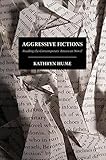Aggressive fictions : reading the contemporary American novel / Kathryn Hume.
Material type: TextPublication details: Ithaca : Cornell University Press, (c)2012.Description: 1 online resource (xiii, 200 pages)Content type:
TextPublication details: Ithaca : Cornell University Press, (c)2012.Description: 1 online resource (xiii, 200 pages)Content type: - text
- computer
- online resource
- 9780801462870
- PS374 .A347 2012
- COPYRIGHT NOT covered - Click this link to request copyright permission: https://lib.ciu.edu/copyright-request-form
| Item type | Current library | Collection | Call number | URL | Status | Date due | Barcode | |
|---|---|---|---|---|---|---|---|---|
 Online Book (LOGIN USING YOUR MY CIU LOGIN AND PASSWORD)
Online Book (LOGIN USING YOUR MY CIU LOGIN AND PASSWORD)
|
G. Allen Fleece Library ONLINE | Non-fiction | PS374.38 (Browse shelf(Opens below)) | Link to resource | Available | ocn861793338 |
Browsing G. Allen Fleece Library shelves, Shelving location: ONLINE, Collection: Non-fiction Close shelf browser (Hides shelf browser)
Includes bibliographies and index.
The author-reader contract -- Narrative speed in contemporary fiction -- Modalities of complaint -- Conjugations of the grotesque -- Violence -- Attacking the reader's ontological assumptions -- Why read aggressive fictions?
A frequent complaint about contemporary American fiction is that too often it puts off readers in ways they find difficult to fathom. Books such as Bret Easton Ellis's American Psycho, Katherine Dunn's Geek Love, and Don DeLillo's Underworld seem determined to upset, disgust, or annoy their readers--or to disorient them by shunning traditional plot patterns and character development. Kathryn Hume calls such works "aggressive fictions." Why would authors risk alienating their readers--and why should readers persevere? Looking beyond the theory-based justifications that critics often provide for such fiction, Hume offers a commonsense guide for the average reader who wants to better understand and appreciate books that might otherwise seem difficult to enjoy. In her reliable and sympathetic guide, Hume considers roughly forty works of recent American fiction, including books by William Burroughs, Kathy Acker, Chuck Palahniuk, and Cormac McCarthy. Hume gathers "attacks" on the reader into categories based on narrative structure and content. Writers of some aggressive fictions may wish to frustrate easy interpretation or criticism. Others may try to induce certain responses in readers. Extreme content deployed as a tactic for distancing and alienating can actually produce a contradictory effect: for readers who learn to relax and go with the flow, the result may well be exhilaration rather than revulsion. --
COPYRIGHT NOT covered - Click this link to request copyright permission:
There are no comments on this title.







